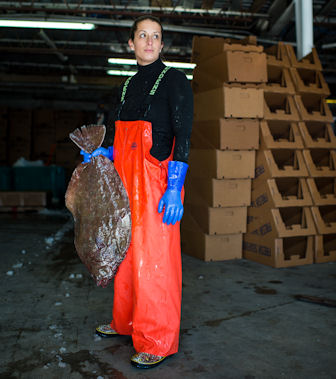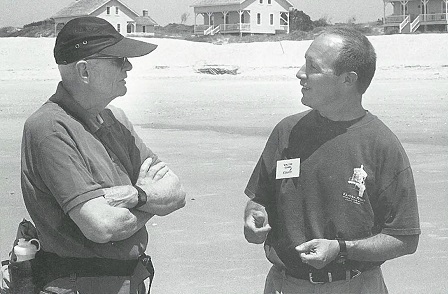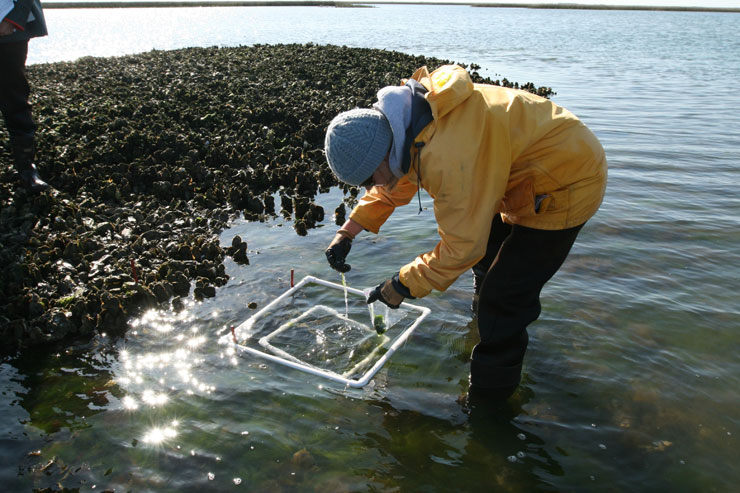COMMUNITY CHARM: Wanchese Implements Innovative Zoning

In the heart of the tiny fishing village of Wanchese, Lorraine Tillett strolls over to a fence surrounding the small backyard of a blue house. Tillett leans over the fence to pet a reddish-brown horse not far from a haystack.
“See how friendly the horses are,” says Tillett, a long-time Wanchese resident. “This is a perfect example of a traditional village business. The new zoning allows for boarded horses and equestrian-related uses.”
Approved by the Dare County Commissioners in March 2006, the Wanchese zoning plan allows for traditional businesses in homes as a “commercial accessory use” to the primary residence — from boat building and crabbing to pet grooming and car repair.
The tiny community on the southernmost end of Roanoke Island centers around the Wanchese harbor that leads to some of the richest fishing spots in the world.
“It is creative zoning,” says Tillett, a former Dare County zoning administrator. “Wanchese is exactly the way it was 100 years ago, except for new modem buildings.”
The innovative plan orchestrated by Tillett, along with numerous Wanchese residents, restricts development, yet allows for fish houses overlooking the harbor. “I came up with a plan where there is zero setback on all waterfront property,” Tillett says.
“If someone has an existing structure, and it is burned or destroyed during a disaster, it can be rebuilt. We also limited single-family lots to 20,000 square feet, but kept all the existing property lines.”
And in the village commercial district that includes a U.S. Postal Service substation and a general store, business owners may have a retail establishment on the first floor and a residence on the upper level.
All together, the plan includes 12 zoning districts — from “Wanchese Wharf Marine Commercial” that allows for boatyards, offices, schools, taxidermy and marine businesses to “Baumtown Traditional” that permits mobile and single-family homes, as well as farming, waterfowl, poultry and greenhouses.
“People come here for the rural value of life that has been unimpeded by development,” says Bill Wilson, owner of the Wanchese Inn. “The consensus of residents was that they wanted to maintain the village’s charm and small-town family values and atmosphere.”
WATERFRONT ACCESS ISSUES
In coastal North Carolina, both small and large communities are struggling with waterfront issues. The N.C. Waterfront Access Study Committee offered recommendations to the N.C. Joint Legislative Commission on Seafood and Aquaculture in April. Chaired by North Carolina Sea Grant Executive Director Michael Voiland, the 21-member committee includes representatives from state and local governments agencies and a variety of stakeholders.
“Our committee realized that innovative planning and zoning approaches, like those carried forth in Wanchese, are part of the answer to addressing the loss of working waterfronts in North Carolina,” Voiland says.
“In fact, I’m certain that every measure taken to stem the loss of traditional waterfront uses and to secure public access will require some willingness by people to change — and also to become directly engaged in how the waterfront will look and be used in the future.”
In 2006, the North Carolina Coastal Federation recognized Wanchese’s Zoning Committee for its innovative zoning plan with a Pelican Award for outstanding environmental service.
Along the North Carolina coast, Wanchese is the only unincorporated community with special zoning for traditional fishing village businesses, according to N.C. Division of Coastal Management officials.
In Dare County, the villages of Colington, Roanoke Island, Avon, Buxton and Hatteras have comprehensive zoning plans. And the villages of Rodanthe, Waves, Salvo and Frisco are zoned S-1, an open classification that allows all uses but establishes some setbacks, height limitations and lot coverage.
In addition, Dare County set up a Special Environmental District for the Buxton Woods maritime forest. To protect the vegetative canopy of the forest, the zoning establishes special standards for land clearing and vegetation removal.
New zoning is being developed for Manns Harbor, as well as the village of Mashoes that is north of Manns Harbor. A plan for East Lake in Dare County has yet to be developed.
VILLAGE’S ZONING EFFORTS
Before the new zoning plan was adopted, the Dare County Planning Board made two unsuccessful attempts to zone Wanchese in the past 25 years.
“Zoning was a dreaded word because the business owners feared losing their fish houses and the family fishing village atmosphere,” Tillett says.
They worried that if there was a natural disaster, rebuilding efforts would not meet the Coastal Area Management Act (CAMA) setback requirements, she adds. In 1974, the N.C. General Assembly passed CAMA to balance environmental protection and economic development in 20 coastal counties.
In 2002, Wanchese zoning came up again when Dare County was updating its land-use plan as required under CAMA. On the draft map, county planners designated the south end of Roanoke Island, including large tracts of wetlands, for generic community use.
The county requested that the rest of the area be designated a “community village” to include mixed commercial and low-density residential development.
“Land uses in the Wanchese District provide compatible, harmonious and an orderly business way of rife that meets the needs of locals, the entire community and visitors, while retaining its charm as a fishing village,” Tillett says.
In early 2004, the Dare Board of Commissioners began taking steps to zone the unincorporated parts of the county. Wanchese was to be zoned S-1.
“It’s a band-aid fix-all that allows the county to review the plan for setback and parking,” says Tillett. “The community didn’t want it. The residents just wanted to work to preserve the village atmosphere.”
Under S-1 zoning, new buildings would need to comply with the N.C. Building Code, as well as CAMA regulations.
“Most of the setbacks for waterfront property are locally adopted,” explains Spencer Rogers, North Carolina Sea Grant coastal construction and erosion specialist. “CAMA requires a vegetative buffer of 30 feet from impervious surfaces such as buildings, parking lots and roads.”
STREET-BY-STREET
Around this time, Dare commissioners approached Tillett about designing an acceptable zoning map. She was selected because of her zoning experience and reputation for being able to work with people. Her strong ties to the fishing village helped her negotiate with residents and develop an innovative zoning plan.
“All of our village has special needs,” she says. “It is important to pay as much attention to the needs of mobile-home owners as someone in a multimillion dollar development.”
First, Tillett met with village seafood dealers at a local restaurant to garner their support for a plan.
“We wanted to be able to rebuild and use the property again if a fish business collapses or if there is disaster,” says Joey Daniels, president of the Wanchese Fish Company.
Under the Wanchese plan, the owners can rebuild to the former status but no greater. They also are exempt from the standard provisions of Dare County’s zoning regulations that limit owners to maintenance and repair of 50 percent of the structure.
After the initial discussion, Tillett began meeting with other community members and set up “captains” for the more than 50 roads in Wanchese.
All totaled, she organized 45 community meetings and assembled 20 volunteers, with the help of Wanchese resident Buttons Daniels, who worked on advertising and public response.
“Residents from different communities were invited for one night where they could ask questions if we were focusing on their road,” Tillett says.
When developing the plan, Tillett learned every nook and cranny of the community. “In 2004, more than 6,900 cars came to Wanchese every day and tripped over the meter near Skyco Road,” she says.
“At that time, there were 54 businesses, five restaurants, 12 boatbuilding shops, 120 mobile homes and 600 residential homes.”
After 18 months, Tillett had met with most of the village residents and convinced them to endorse the plan.
“Lorraine used to work with the planning board and had a key understanding of the issues,” says Allen Burrus, Dare County commissioner who also served on the state waterfront committee. “She had 90 to 95 percent of the community behind her. She did it house-by-house and street-by-street. Everybody was included.”
VILLAGE GLIMPSE
To get to Wanchese, take U.S. 64 in Manteo and follow it to N.C. 345 — the only land access to the village.
When turning onto the highway, there is a stretch of marshland. A truck towing the large fishing boat Ya Mamma creates a long line of traffic.
Not far down the road, a recreational area is being developed for boaters and campers. The first sign of activity is Mann’s Hardware and Grocery Store, where fishing captains stop for supplies and repairs for their boats and trawlers. They also gather at Mann’s Luncheonette to eat a home-cooked meal and swap fishing stories with locals.
Just past Mann’s, there are several cottage-style homes, a large white church and side streets named after locals — including E.R. Daniels and Tink Tillett.
Many of the streets have homes that have been in families for several generations. For example, Lorraine Tillett’s large white-framed home was built by her grandfather in 1892.
She inherited the homeplace filled with family memorabilia from her father, Alfred “Dad” Tillett.
Her father moved back to Wanchese after living in Washington, D.C., for 50 years, and he set up a welding shop in the backyard. “He was known as ‘Dad’ and ‘Mr. Fix It,'” she says. “Dad built 40 fish conveyors from Ocracoke to Virginia Beach.”
On a brisk day, Tillett gives a tour of the new zoning districts.
As she turns onto Pugh Road, Tillett points out where the owners are building a cottage next door.
“This new building is allowed in the zoning plan,” says Tillett. “The accessory dwelling unit or guest home cannot exceed 900 square feet of heated space and must be associated with the principal residential use and occupied by the owner or family member.”
She also points out the Baum home, an old, white-framed Victorian house with gingerbread trim.
Then she heads down to Old Wharf Road, which is split into both “neighborhood commercial” and “village residential.”
In the village residential section, Tillett, who knows most residents on a first-name basis, stops at Holton Custom Yachts, owned by Billy Holton who lives next door.
In this district, the custom yachts cannot exceed 75 feet. The boats can be built in garages, which are considered accessories to a residence.
“I don’t like the zoning plan,” Billy Holton says. “I am from the old school. If I own something, I want to use it the way I want to. The zoning restricts growth.”
To build larger boats, Holton would have to relocate his business to a commercial zoning area.
For example, Spencer Yachts — which manufactures large sportfishing boats — is in a marine commercial zoning area that allows for boats greater than 75 feet in length.
As Tillett stops near the Spencer operation, she points out that many nearby homes face a canal that runs into the Pamlico Sound.
“The whole island is accessible by water,” Tillett adds.
When heading to Baumtown — a quiet residential section that has been around for more than 200 years old — Tillett says that there is still a lot of open space.
She drives down a long lane that leads to Winky Silver’s old home. “Winky has a garden and shed and an old-time way of living,” she says. “He also has hens and is a beekeeper. This is allowed in the zoning.”
FISHING HUB
Another section with a strong heritage is Historic Mill Landing, where large seafood businesses overlook the Wanchese harbor.
Zoned “marine commercial,” it is filled with large seafood businesses that are built up to the harbor’s edge.
At Wanchese Fish Company, a man loads seafood onto a truck. At the back, more than a dozen pelicans are perched on the dock posts. On the pier, several men are repairing a net on a trawler. Nearby is Willie Etheridge Seafood Company, one of the village’s oldest businesses built upon a family fishing tradition.
“Lorraine did a remarkable job on the zoning,” says Mark Vrablic, Etheridge Seafood vice president and general manager. “She put a lot of effort in it I haven’t heard anybody complain about the regulations since they took effect.”
Because the village is so small, some businesses, including the Harbor Marina, have no name on the door.
For lunch, Tillett stops in and orders a hamburger, fries and ice tea. “Local fishermen often come here,” says Tillett.
After lunch, Tillett stops by Capt. Male’s Seafood Market. “We are really happy with the zoning,” says market manager Frank Miller. “We blocked condos from coming. We still have a small town with small-town businesses.”
Then Tillet heads to the Wanchese Industrial Park, which was first developed in the 1970s. However, boatbuilders didn’t begin leasing space until 1983 when Buddy Davis opened the first boatyard.
Today, there are a variety of businesses, including a U.S. Coast Guard office and a seafood processing facility.
“Under the zoning plan, Dare County allowed the park to continue to be governed by the North Carolina Seafood Industry Park Authority that governs setback, storm water management, property uses and other issues,” says Bob Peele, director of the Wanchese Industrial Park.
One of the last stops on the tour is the O’Neal home that is zoned “waterfront residential.”
In a side yard facing the water, more than 900 crab pots are stacked several feet high.
Linda O’Neal, who has a home on the property, says that the crab pots belong to her sons and husband.
“A farmer can’t hide his tractor,” says O’Neal. “And you don’t hide buildings. So why should we hide our livelihood? At the same time, we want to keep a nice place.”
To review the Wanchese plan and maps, visit http://www.darenc.com/.
For more information, contact Lorraine Tillett, lorrainenc@charter.net.
Download the N.C. Waterfront Access Study Committee Final Report.
This article was published in the Early Summer 2007 issue of Coastwatch.
For contact information and reprint requests, visit ncseagrant.ncsu.edu/coastwatch/contact/.
- Categories:


